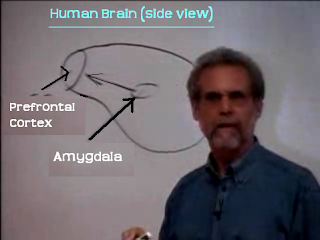
Daniel Goleman, the author of the #1 best seller,
Emotional Intelligence, gives hope to all the people who struggle to achieve high test scores or don't meet the requirements for having a high
intelligence quotient (IQ). Goleman stresses the point that the most successful people in this world, especially in the work place, have a common characteristic of high
emotional intelligence.
According to Goleman there are six aspects of emotional intelligence. The first of these aspects is having a drive to achieve. A person who has a very high IQ can be absolutely useless if they do not have a drive to achieve. Therefore a person who has an average IQ who has a drive to achieve can be much more useful than a person with a high IQ and no drive to achieve.
The next part of emotional intelligence is the ability to successfully persuade and argue with others. In my opinion this characteristic has a small trace within the IQ but relates to emotional intelligence because of the need to be reasonable and have the ability to relate to people.
The next characteristic is pattern recognition and the ability to see what matters. This deals with knowing when to care deeply about things and knowing when to let things go. It is connected to social intelligence and something that a person with a high IQ can easily lack. Another characteristic within emotional intelligence is the ability to analyze and change problems. A person with a high IQ may able to remember important facts and be considered intelligent for that, but someone with high emotional intelligence is analyze certain things so that they have a value, even though they may not be able to remember as many things. The next aspect of emotional intelligence is initiative, or taking on challenges without having to be asked. This characteristic is often highly valued in the work place. Interns often use their initiative to get a job in order to make up for defects in a resume.
Finally, one more very important aspect of emotional intelligence, is self-confidence. This aspect of emotional intelligence can increase a persons general value because a confident in one's self allows one to bring out their positive qualities. A person with just as many positive qualities who isn't self-confident will not appear to having any value because their positive characteristics will not be revealed without a sense of confidence.
In conclusion, there are many different definitions for intelligence. Some say that it is the
ability to comprehend while others say that it is the ability to memorize. Either way intelligence
is often a measure of a person's ability to succeed. This is true in a way, but only if emotional
intelligence is included within this measure of intelligence. Goleman supported this thesis in
his lecture at Google and this theory seems to be taking a strong position within the work place.
The link below is a humorous take on the way some people demonstrate absolutely no intelligence at all.

































